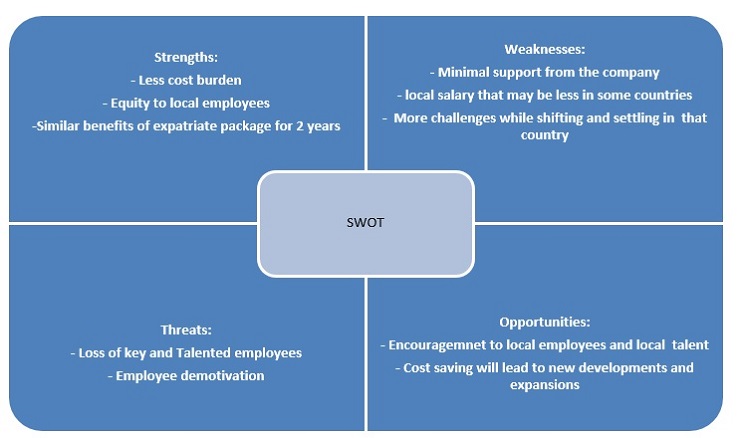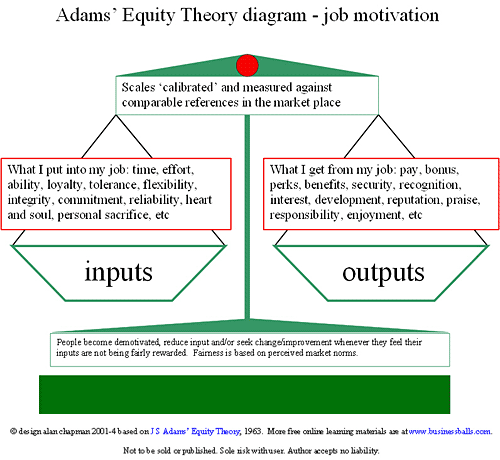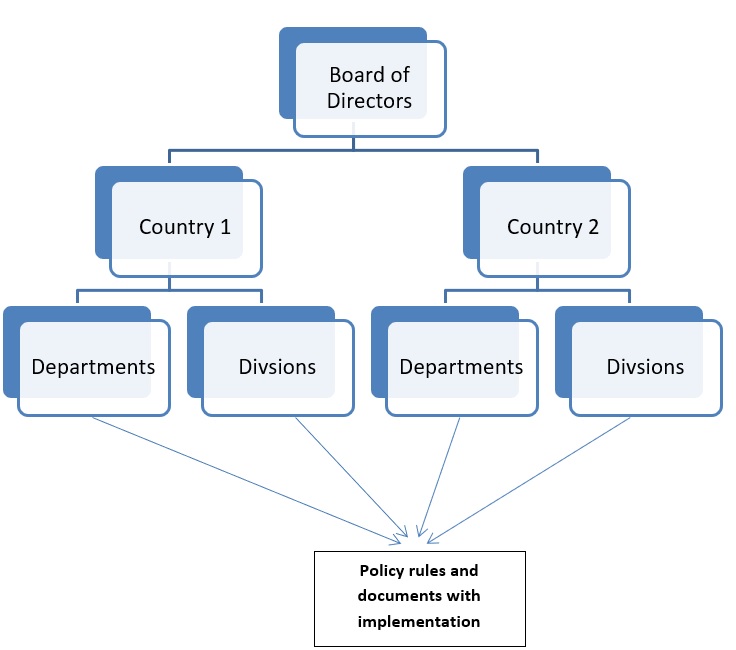Managing Complex Employment Expectations Case Assignment
{`
LOCAL AND INTERNATIONAL?
MANAGING COMPLEX EMPLOYMENT EXPECTATIONS
Case Assignment
`}
Case Assignment Questions and Solutions
Question 1
The case here is dominated with the struggle an employee faces while changing countries for career opportunities within the same job and even get more difficult when the company policies does not extend support.
Same thing happened to Akiko, while she made a plan to shift to Singapore as her family obligation. The contract put in front of het is completely different from what she got two years back when moved from Tokyo to New Delhi. So, there are two contracts which we term as a traditional expatriate contract and the new local international contract.
In this section, we’ll discuss about the ‘Traditional Expatriate Contract’ which is a bundle of benefits for the employee who is moving abroad or in different countries for their career enhancements or as a requirement by the company. The Traditional Expatriate Contract includes the following benefits:
Benefits of Traditional Expatriate Contract
- Special treatment for Expatriate employees in the foreign country.
- Relocation support
- Visa and tickets support
- Medical support for self and family
- Education including ‘hunting for school’ support
- Higher salary
- Package for two years where she have to return to her home country i.e. Tokyo after 2 years.
- Still be under the home social security, health insurance and pension plan.
Note: Total benefits ranges up to 3 times of the base salary of an employee with a special treatment to an employee.
Reasons behind providing such benefits
- The employees are from the ‘Special Talent pool’ that has to be retained and thus, provided a special treatment.
- To help such a high talent people for easing up their settlement and children’s education in the foreign country.
- Such benefits are attributed as the transfers are on the assignment basis and of short duration.
Limitations of the Traditional Expatriate Contract
- The contract is a heavy cost burden on the company i.e. nearly 3 times of the base salary.
- The people and the employees started misusing the service while changing the countries frequently.
- Many employees started staying in the country for 8 to 10 years on expatriate contract by extending the assignment or through any other reason.
- The local employees feel demotivated while getting lower salary than the expatriate employee who does the same work.
The expatriate contract is mainly for those special employees have been asked by the company to work in the foreign country for their exposure or for some assignment. The benefits that are attributable to the contract dimensions actually make the shifting, settling and the stay of an employee and its family in the foreign nation pleasentful and without any much struggle. The only major limitation that the company faces is in terms of an extra cost burden on the company’s accounts. But, that is justifiable with respect to the sacrifices the employee is making with regard to the change of place, change of language, change of culture, struggle for the children’s education, leaving the home country and their national security and saving plans. In order to reduce the employees sacrifices and struggle one more component is added in the expatriate contract and that is the protection of employee’s national security, pension plans and other saving and medical plans with the home country.
Thus, in short the Expatriate contract is interesting and attracts most of the employees who love travelling and who want to enjoy high salary and benefits regardless of the fact that they have to leave their home country.
Question 2
SWOT analysis is the tool to analyze the internal as well as an external environment of any organization. Through this analysis one can assess the strengths, weaknesses, threats and opportunities attributed towards an organization.
Internal Environment:
- Strengths
- Weaknesses
External Environment:
- Threats
- Opportunities
SWOT analysis of the Local International Policy
Local International policy is the policy that stands in the middle of the expatriate contract and the local contract. It is not a pure expatriate contract and also is not a pure local contract.
That means, in the local international policy the employee will enjoy the benefits of the expatriate contract for only 2 years of settlement and that too with the local salary. After the completion of the 2 years, the employee will be referred with the features and benefits of the local contract which is purely a low budget contract with no special treatment, but like only a local employee.
This will be a cost effective contract for the company and also featured to protect the interest of the local employees with no misuse of the benefits by an expatriate employee on the cost of the company.
It should be noted that this contract is focused for those employees who want to shift to another country as their own need and call with no company intervention and suggestion. Thus, the employees who are not sent to the other country by the company in terms of company’s assignments cannot enjoy the whole lot of benefits that a pure expatriate employee enjoys.
Owing to all the above facts, following is the SWOT analysis of the local international policy.

The Local international policy is cheaper to the company than the traditional expatriate contract, which is the major strength of the local international policy. It offers very less benefits to the employee which is at par treating the employee as a local employee, apart from the first two years that offer similar benefits as the Traditional Expatriate Contract used to offer with a low bandwidth. The reason behind adopting new rules and new policy is to attract the local talent, motivates them by providing equal salary to them as to the international employees and to save cost which could be used for further expansions and developments of the business.
But, this contract has some threats on account of which the business can incur some losses such as employee demotivation and high attrition rate i.e. loss of key and worthy talent from the organization. This could be an indirect cost to the organization in terms of new talent hunt, induction and training cost and cost attributed to loss of work.
Therefore, this is the SWOT analysis of local international policy being executed by the organization as its cost measure.
Question 3
Local international package is somewhat reluctant to survive the employee’s needs and being dominated with the benefits that the employers may get. It is more like a local contract but with an expatriate employee benefits for only two years of initialization and at a local salary.
International mobility is an opportunity for both employees and employers as the employees always seek new opportunities on shore or off shore and the employers are always on hunt of special talent across worldwide. But, there are some challenges also that both the parties face. For employees, shifting a whole family and settling out in new place is always a critical decision whilst many challenges waiting on the door. Also, the education of the children, language barriers and cultural differences are always a hindrance in smooth settlement. Similarly for employers, the extra cost burden, adaptation of employees, reluctant behavior of the local employees and other organizational issues pose some challenges to the employers, though not at par of what is being faced by the employees.
Catering to all such challenges and difficulties, following are the needs of both employers and the employees regarding international mobility on a local international contract.
Needs of Employers:
- Transfer of a talent at less cost to the company.
- Protecting the interests of the local employees.
- Applying the theory and principle of Equity around all the organizations.
- Providing the basic support at an initial stage.
- Safeguarding the interests of the organization and its employees.
- Retaining their key talent and employees.
Needs of Employees:
- Aiming for the better opportunity.
- Getting a full support of settlement in the country for as long as the stay is.
- Getting medical and education support for the family and the children from the organization.
- Getting a higher salary as a compensation for leaving their national security, culture and home.
Elements to be included in the package
- The package is at par with the needs of the employers but with a risk of loss of talent. Thus, package should include some additional features like slight higher salaries to the international employees with a company sponsored residence.
- The package is not conducive with the needs of employees. But taking care of the needs of the parties, a slight high salary, and company sponsored residence and pension plans would provide a difference and a support to the needs of both the parties.
Therefore, in order to get the best package that suits to the needs of employers as well as employees requires a midline settlement where at some points employee needs to balance and sacrifice and at some points the employee needs to balance and sacrifice.
This package is a true picture of the settled work done by the company where the employee gets what is needed and desired with a time limit and the employer gets what is needed accordingly.
The only risk lies in front of the employers is the loss of new talent and skilled people because of the change in the contract and policies. To attract the employees and to retain them, the employers have to add some mouthwatering features in the current local international policy. Such features may be in terms of a slight higher salary of international employees as compared to the local employees, pension plans for their retirement as they have left their home country to take care of all these things and an education support for their children as this is the critical point for the families and children to manage their education part in the country that have stepped in for the first time.
Thus, all these things will give the local international policy a successful go show.
Question 4
When we talk about the comparison between the three jobs contracts, we can sense a sheer difference between the benefits and perks one gets while doing the same job.
Expatriate contract gives an extra dose of benefits with special treatments, higher salaries, perks and benefits.
Local international contract gives similar benefits in initial stages of settlement with a local salary and a local treatment after 2 years.
Local contract is for the new joiners who will not get any special benefits but a treatment like a local employee in all aspects.
Note: The role and work is same for all the employees with different packages.
Equity Theory
Equity means fairness and justice towards ones outputs in relation to ones inputs with respect to the outputs and inputs of referents.
Equity theory states that the distribution of the resources should be fair and equal to the referent parties. No party should be under rewarded or over rewarded for the same level of inputs they contribute for the same work. It focuses on the balanced approach towards the fairness with respect to the outputs one gets for the same level of inputs that person contributes with respect to the relational or referent parties.
If any individual is over rewarded, then the referent or relational parties might get distressed, demotivated or might become rebellion for their input –output ration in comparison to that individual’s input –output ratio.
Similarly, if any individual is under-rewarded, then that individual might become distressed, demotivated and rebellion in terms of low compensation he/she is getting for the same work and hardship in comparison to their counter parts or referents.
Both the above situation is a risk to the management or an organization as they may end up losing key employees for such disguise.
Similar situation is created when Akiko asked for higher salary and better benefits for her transfer to Singapore in terms of local international policy.
Connecting it to the equity theory that states the concept of fair treatment in respect of compensation, job roles and other aspects in an organization with all the employees; we could clearly state that the contracts are unfair with some exception when the company has send the employees to other countries for some special assignments and a limited time span.

The above theory states that the employees will be motivated when they get fair outputs of their equal inputs. Thus, the expatriate contract is justifiable but the difference between the local international contract and the local contract is unfair and should have same benefits and features.
The referent persons are (parties involved for comparison):
- Expatriate Contract: Akiko and other local employees
- Local International Contract- Akiko and other local employees
- Local Contract- Hiroshi and other local employees
Procedural justice
The procedural justice could be implemented as a fair rule practice for all the employees in order to provoke positive behavior intentions among its employees:
- The company could set same rules for every employee without any partiality and special treatment.
- There should be consistency where the like cases are treated in a like manner.
- The decision makers within the company should be unbiased and fair.
- There should be the policy of raising voice, representation and asking justification.
- The processes and rules should be transparent with no hidden parameters.
Question 5
The globalization of anything in an organization needs some policies and its framework. In order to make the local international contract globalized for the international employees, the company has to follow some steps:

Therefore, the policy should be executed from the Board of directors that will flow to the heads of all the countries, from where the policy documents and rules are flown to each department and divisions of the countries, where they get implemented to make the rules equally fair for all.
Remember the following points:
- The policy has to be made while taking care of the needs and purposes of each and every resource of an organization worldwide.
- It should fit to the expectations of everybody in an organization and should become the source of motivation for all.
- It should be implemented at all levels of hierarchy without any discrimination.
- It should be communicated to all the departments and divisions via emails and open circulars.
- A reality test of the policy is to be made at a ground level to assess its outcomes, employee reactions and perceptions, before its implementation.
- It should be fair, justifiable and open to debate for all.
Therefore, in this way, the organization could serve an equity and fair values to all its employees across the worldwide.
References
equity theory of compensation - Google Search. (2017). Google.co.in. Retrieved 4 April 2017, from https://www.google.co.in/search?q=equity+theory+of+compensation&source=lnms&tbm=isch&sa=X&ved=0ahUKEwix_aOhy4vTAhVHP48KHYAUCk8Q_AUIBigB&biw=1517&bih=654&dpr=0.9#imgrc=y0eSUTLTVPo-PM:
adams equity theory - workplace motivational theory - how individuals measure inputs and outcomes in relation to market norms and 'referents'. (2017). Businessballs.com. Retrieved 4 April 2017, from http://www.businessballs.com/adamsequitytheory.htm
Procedural Justice | Beyond Intractability. (2017). Beyondintractability.org. Retrieved 4 April 2017, from http://www.beyondintractability.org/essay/procedural-justice
Policy Framework - Governing Policy. (2017). Usc.edu.au. Retrieved 4 April 2017, from http://www.usc.edu.au/explore/policies-and-procedures/policy-framework-governing-policy


